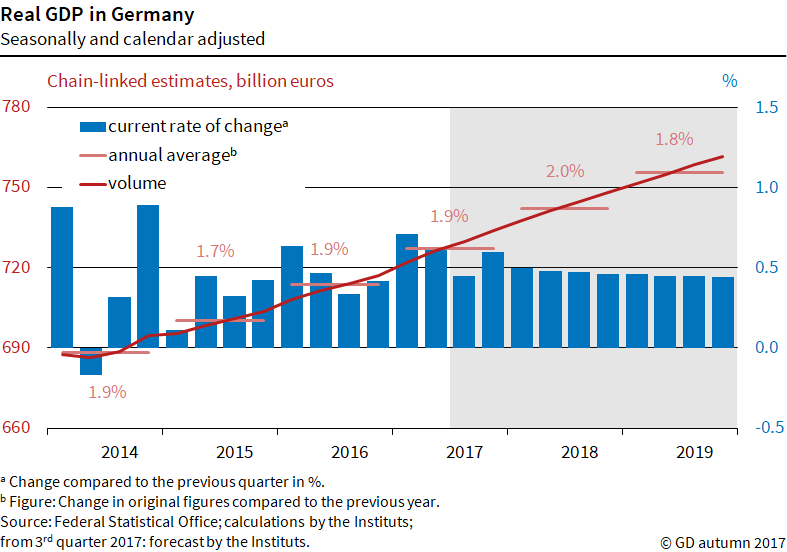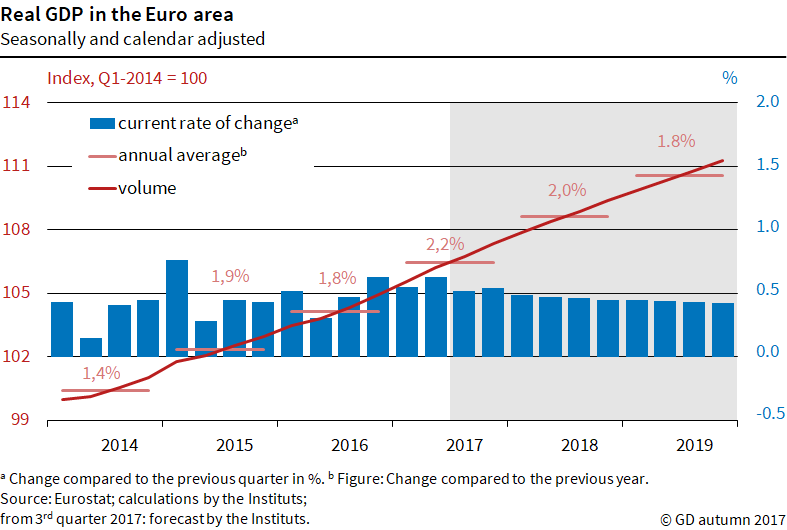ECONOMICS
I -- Introduction to Economics, National Accounting and
Microeconomics -- EFA 3rd semester
WS
2018/19
|
Basic Information
Literature:
Interactive Participation:
Preliminary schedule:
|
| No | week | date | presentation | Unit - topics (Preliminary Schedule) | Material |
| 1 | 1 | 02. Oct | Introduction: Basic problems (In classs: Teamwork
about Mankiws
"Ten Principles of Economics" & |
||
| 2 | 1 | 03. Oct | PART
A: INTRODUCTION Mankiws "Ten Principles of Economics" |
||
| 3 | 2 | 9. Oct |
1:
Introducing economics |
- Hierarchy
of goals in market economies Please use the online resources, tests and case studies on the Sloman webpage (see above) |
|
| 4 | 2 | 10. Oct |
(no pres. 1) |
Mankiws
"Ten Principles of Economics"
14 The National Economy in MÜ part: |
- Hierarchy
of goals in market economies Please use the online resources, tests and case studies on the Sloman webpage (see above)
- EconLit Additional tools Example from another class: Corrected Version of a Reference List |
| - | - | - | Current Macroeconomic issues: | (to be updated)
Upturn Remains Robust – Amid Mounting Tensions Press release with Summary with Key Forecast Figures (PDF, 192 KB) |
  |
| 5 | 3 | 16. Oct | Outlook to Part D:
14 The National Economy
Presentation
methods and strategies
|
German National
Accounting @DeStatis: - GDP to NNY and summary of National Income accounting IN FOCUS @ Destatis: Overall economic equilibrium: 50th anniversary of the Magic Square - Eurostat
with National
Accounts Other sources
of data and information: |
|
| 6 | 3 | 17. Oct | Critiques of GDP: SUSTAINABILITY Global
goals for sustainable development
+++ OECD Centre +++ |
- What if the common good was the goal of the economy? | Christian Felber | TEDxVienna (ME s.b.) - How can countries measure the well-being of their citizens? (TED institute) "Monitoring
economic performance, quality of life and sustainability"
by the German Council of Economic Experts in association with the french
Council of Economic Analysis - Joint Report 2010 requested by the Franco-German
Ministerial Council to Chancellor Mrs. Angela Merkel and french President
Nicolas Sarkozy (deutsche
Übersetzung: Wirtschaftsleistung,
Lebensqualität und Nachhaltigkeit: Ein umfassendes Indikatorensystem).
This report (and request) was based on the ... The German Statistical Office (DeStatis) publishes Environmental indicators and also an "Indicator Report 2016: Sustainable Development in Germany", also see "Wie misst man Wohlstand?" |
|
| 7 | 4 | 23. Oct | 15 Macroeconomic Issues and Analysis: an Overview |
Balance of Payments: |
|
| 8 | 4 | 24. Oct | PART B: FOUNDATIONS
OF MICROECONOMICS 2: Supply and demand |
||
| 9 | 5 | 30. Oct | 2: Supply and demand | ||
| 10 | 5 | 31. Oct | no class | national holiday | Review: (Contents_of7th_edition.doc) |
| 11 | 6 | 06. Nov | 3: Markets in Action | Topics
of Midterm: Introduction, basic questions, objectives (hierarchy of
goals), 10 Principles of Economics, chapters 1-3.1 |
|
| 12 | 6 | 07. Nov | Pres. 2 | 3: Markets in Action
-> Elasticity Repetition and questions Part A and B |
(just a reminder: there are many textbook-resources available online) |
 |
The Council of Economic Experts delivered the annual report 2018/19 to the German government. Setting the right course for economic policy
Weitere
Infos zum Thema: |
||||
| 13 | 7 | 13. Nov | (reakkreditation meeting) | 3: Markets in Action -> Elasticity | |
| 14 | 7 | 14. Nov | Midterm test Pres. 3 |
PART C: MICROECONOMICS 4: Background to demand |
External links:
ERS Glossary, Price Elasticity of Demand, Income Elasticity, Excel-File with empirically measured Elasticities (xls 13 MB, zip 1,3 MB) from Defra |
| 15 | 8 | 20. Nov | Pres. 4 | 5: Background to supply | Review of old exams |
| 16 | 8 | 21. Nov | 5: Background to
supply 5.6 Profit Maximization |
The production process | |
| EFA-Symposium 2018 | 22. - 23. Nov ALL EFA students have to attend the -> | EFA-Symposium 2018! | |||
| 17 | 9 | 27. Nov | Pres. 5 | 5: Background
to supply |
|
| 18 | 9 | 28. Nov | 5: Background
to supply 6: Profit maximising under perfect competition and monopoly |
||
| 19 | 10 | 6: Profit maximising
under perfect competition and monopoly 7: Profit maximising under imperfect competition |
|||
| 20 | 10 | 05. Dec | Pres. 6 | 6: Profit maximising
under perfect competition and monopoly 7: Profit maximising under imperfect competition |
|
| 21 | 11 | 7: Profit maximising under imperfect competition | |||
| 22 | 11 | 12. Dec | Pres. 7 | (7) ... imperfect competition - Oligopoly -> Game Theory | |
| 23 | 12 | Pres. 8 | Review / Repetition and questions - chapters 4-7 (and also 1 (Mankiw) - 3) |
Bundeskartellamt
- Control
of abusive practices - Ban
on cartels -
Movie
"A
beautiful Mind" about John
F. Nash |
|
| 24 | 12 | 19. Dec | Pres. 9 |
|
Some
Videos "Fight of the Century" / Fear
the boom and the bust ... and why not enjoy Deck the Halls with Macro Follies |
| 25 | 13 | 08. Jan | 8: Alternative theories
of the firm 9: The theory of distribution of income |
HAPPY new Year 2019! | |
| 26 | 13 | 09. Jan | Pres. 10 | 10: Inequality, poverty and policies to redistribute incomes | |
| 27 | 14 | 15. Jan | pres. 11 | Review, questions + outlook:
11: Markets, efficiency and the public interest |
Videos about economic approaches: "60 Second Adventures in Economics" (Open University)
|
| 28 | 14 | 16. Jan | Pres. 12 | 12. Environmental Policy | The German Statistical
Office (DeStatis) publishes Environmental
indicators and also an "Indicator
Report 2016: Sustainable Development in Germany". We discussed the
topics for the exam in class. The resulting file "Contents_of7th_edition
EFA Micro.doc" will be available in our AULIS group. |
| 29 | 15 | 22. Jan |
Pres.
13 |
13. Government Policy towards Business |
Review
and conclusion + YOUR questions Exam preparation - summary and questions |
| 30 | 15 | 23. Jan | Final test |
Review of old exams |
Videos about economic approaches: "60 Second Adventures in Economics" (Open University) |
![]() Groups (Module exercise): The "Module
Exercise" takes place every week <45-90 minutes every week
integrated into our class on Wednesdays> We formed 6 groups and every
group is assigned tasks for the next session and is expected to present
the results (=prepared at homework)
Groups (Module exercise): The "Module
Exercise" takes place every week <45-90 minutes every week
integrated into our class on Wednesdays> We formed 6 groups and every
group is assigned tasks for the next session and is expected to present
the results (=prepared at homework)
The module exercise is part of your individual workload, it isn't marked
and the lecturer won't deliver new information; he will only moderate the
sessions. The tasks of the module exercise normally refer to the topics
discussed in the last week(s). The numbers in the table below normally refer
to the chapter in the textbook (Sloman: "End of chapter questions").
At the end of the module exercise there is room for general questions about
the topics, terms, ... .
The exercises discussed in the module
exercise are relevant for the exam. If
the students deliver results or approaches to the solution, we'll discuss
the correct solution in class. If no approaches are presented, the task
will not be discussed in class but nevertheless stay relevant for the exam.
|
|
|
 Beta
Beta |
 Gamma
Gamma |
 Delta
Delta |
|
|
|
| names of students / pictures |
Steffi, Larissa, Leonie, Hanna, Tjaerk | Christina, Annika, Lucas, Moriz, Jan | Kirsten, Alex, Meike, Alicia, Arzu | Florian, Patrik, Jan, Steffen, Wilhelm, Thorben | Nicole, Valerie, Jule, Armine, Dominic | Laurent, Johann, Marcel, Fisun, Bisra | |
| 09. Oct (Tuesday) | Mankiws
"Principles" & - presentation in class: |
1-2 |
3-4 |
5-6 |
7-8 |
9-10 |
Obama |
| 17. Oct. (Wednes) | Mankiw:
"Problems and Applications" |
Sloman
p 29 (End of chapter 1 questions) 5 and 6 |
13-15 |
10-12 |
7-9 |
4-6 |
1-3 |
| 24. Oct. ... | Mankiw:
"Problems and Applications" |
No. 17 ONE example ! | + No. 17 ONE example ! | + No. 17 ONE example ! | + No. 17 ONE example ! | + No. 17 ONE example ! | + No. 17 ONE example ! |
Critiques of GDP - Measuring Sustainable Development (See also the Joint Report for the |
In the Report of the "Stiglitz-Sen-Fitoussi commission" on the "Measurement of economic performance and social progress" (2009) the authors deliver 12 recommendations. Each team is requested to present a brief (~ 5-7 min.) summary of two recommendations --------> In the Executive summary (p.7-18) each recommendation is described in one paragraph but you are also requested to refer to the more detailed part of the report or/and other sources. |
1) Recommendations 1 and 2 2) Select one macroeconomic indicator of your choice and briefly present the development of this indicator on 1 or 2 slides (up to 5 minutes) (each team should present for a maximum of 10 minutes) |
1) Recommendations 3 and 4
2) Select one macroeconomic indicator of your choice and briefly present the development of this indicator on 1 or 2 slides (up to 5 minutes) (each team should present for a maximum of 10 minutes) |
1) Recommendations 5 and 6
2) Select one macroeconomic indicator of your choice and briefly present the development of this indicator on 1 or 2 slides (up to 5 minutes) (each team should present for a maximum of 10 minutes) |
1) Recommendations 7 and 8
2) Select one macroeconomic indicator of your choice and briefly present the development of this indicator on 1 or 2 slides (up to 5 minutes) (each team should present for a maximum of 10 minutes) |
1) Recommendations 9 and 10
2) Select one macroeconomic indicator of your choice and briefly present the development of this indicator on 1 or 2 slides (up to 5 minutes) (each team should present for a maximum of 10 minutes) |
1) Recommendations 11 and 12
2) Select one macroeconomic indicator of your choice and briefly present the development of this indicator on 1 or 2 slides (up to 5 minutes) (each team should present for a maximum of 10 minutes) |
| 7 November | EoC Chapter 2 |
1 (recommended to ALL students) | 2 | 4 | 3 and 5 | 6- and 8 |
7 (recommended to ALL students) |
| 28 November | we'll do task 4 of VWL1-MicroExamWS11-12.doc in class EoC Chapter 3 |
3-1 | 3-4 | 3-5 | 3-6 | 3-7 | 3-8 |
| -- | (Chapter 4 not discussed this semester) | 4-8 | 4-7 | 4-6 | 4-2, 4-4 - use (own) illustrations for your answer | 4-1 | Describe the income and the substitution effect using figures like 4-16 to 4-18 |
| 5 December | EoC Chapter 5 |
3 |
4 |
5 |
6 |
7 |
8 |
| 12 December | EoC Chapter 6 ALL students: question 1 |
2 |
3 |
4 |
5 |
6 |
7 |
| 19 December | no homework, we'll
do exercises from chapter 6, tasks: 2, 3, 6 and 8 Additionally we will discuss task 6 from the Microeconomics WS 05/06 EFA 3 (90 min) |
all teams should please prepare the tasks | all teams should please prepare the tasks | all teams should please prepare the tasks | all teams should please prepare the tasks | all teams should please prepare the tasks | all teams should please prepare the tasks |
| NN | no homework, we'll do exercises in class -> VWL1-MicroExamWS11-12.doc | all teams should please look at the whole exam - we'll roll the dice which team presents which task ;-) | all teams should please look at the whole exam - we'll roll the dice which team presents which task ;-) | all teams should please look at the whole exam - we'll roll the dice which team presents which task ;-) | all teams should please look at the whole exam - we'll roll the dice which team presents which task ;-) | all teams should please look at the whole exam - we'll roll the dice which team presents which task ;-) | all teams should please look at the whole exam - we'll roll the dice which team presents which task ;-) |
| NN | Review of old exams |
Review of old exams, e.g. the exam of Microeconomics WS 14/15 | |||||
| NN | YOUR questions |
Links:
Links:
- WIKIPEDIA,
the free Encyclopedia (english)
- Leo -
Online Dictionary
- odge.de: Online-German-English-Dictionary
Learning / Improving your English:
- See the tips on the web page of the "Fremdsprachenzentrum",
especially "Internet
Quellen", "Medien",
and "Englisch
in Bremen"
- Somewhat less actual are the English
Language Resources (ELR) web site of Hochschule Bremen (Bremen
university of applied sciences)
with many useful tips, among other things: "How
can I improve my English outside class?" (with tips for going out:
English Club ... and more).
- also useful a list of English radio stations: http://www.surfmusik.de/land/england.html
![]() Quotations
form the book of Thomas
Friedman: "The World is flat":
Quotations
form the book of Thomas
Friedman: "The World is flat":
- For some, particularly among the older generations, this was
an unwelcome transformation. Communism was a great system for making
everyone equally poor. In fact, there was no better system in the world
for that than Communism. Capitalism made people unequally rich,
and for some who were used to the plodding, limited, but secure Socialist lifestyle--where
a job, a house, an education, and a pension were all guaranteed, even if they
were meager--the fall of the Berlin wall was deeply unsettling. (p. 51/52)
- ... to some degree Mikhail Gorbachev's hapless efforts to reform something
that was unreformable brought communism to an end. But if I had to point to
one factor as first among equals, it was the information revolution that began
in the early- to mid-1980s. Totalitarian systems depend on a monopoly
of information and force, and too much information started to slip
through the Iron Curtain, thanks to the spread of fax machines, telephones,
and other modern tools of communication. (p 54)
-You
are visitor number: